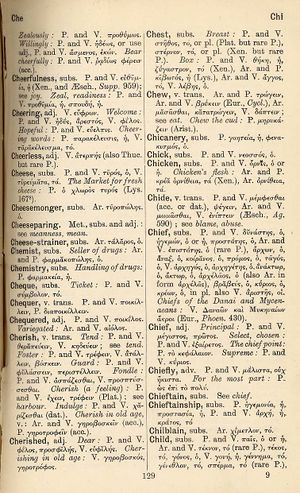child
οὐκ ἔστι γῆρας τοῦδε τοῦ μιάσματος → that pollution never wears out, that pollution can never grow old
English > Greek (Woodhouse)
substantive
P. and V. παῖς, ὁ or ἡ, Ar. and V. τέκνον, τό (rare P.), τέκος, τό, γόνος, ὁ, V. γονή, ἡ, γέννημα, τό, γένεθλον, τό, σπέρμα, τό (rare P.), σπορά, ἡ; see son, daughter.
off-spring: P. and V. ἔκγονος, ὁ or ἡ.
scion: V. θάλος, τό, βλάστημα, τό Ar. and V. ἔρνος, τό; see scion.
little child, infant: P. and V. νήπιος, ὁ or ἡ (Plato, Antigone), Ar. and P. παιδάριον, τό, παιδίον, τό, Ar. τεκνίδιον, τό.
babe: V. βρέφος, τό, τυτθός, ὁ or ἡ.
of children, adj.: P. and V. παίδειος (Plato).
blest in one's children: Ar. and V. εὔπαις, V. εὔτεκνος.
be blest in one's children, v.: V. εὐτεκνεῖν; (Eur., Fragment).
blessing of good children, substantive: Ar. and V. εὐπαιδία, ἡ.
cursed in one's children, adj.: V. δύστεκνος.
having two children: V. δίπαις.
having fifty children: V. πεντηκοντάπαις.
having fair children: V. καλλίπαις.
loving one 's children: Ar. and V. φιλότεκνος.
murder one's children, v.: V. παιδοκτονεῖν.
murdering one's children, adj.: V. παιδοκτόνος.
the guilt of child-murder: V. τεκνοκτόνον μύσος (Eur., Hercules Furens 1155).
from a child: see from childhood under childhood.

